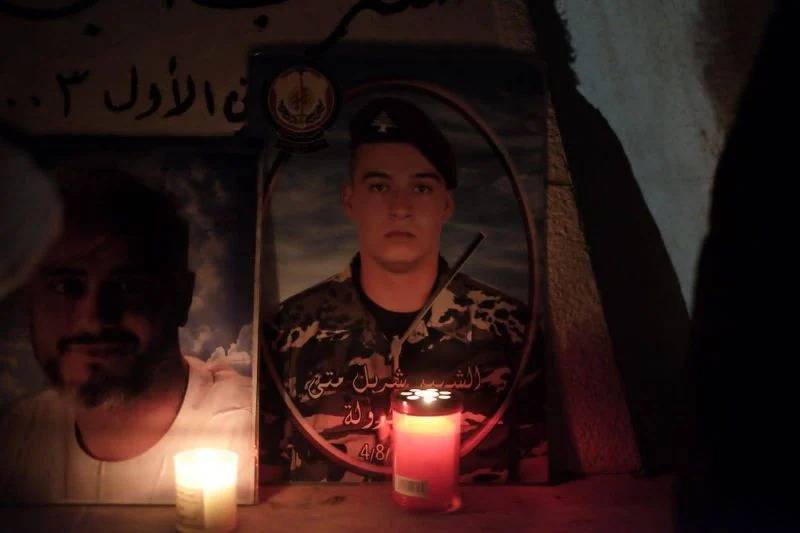
About 30 relatives of the victims gathered near the port of Beirut on Wednesday, under the Statue of the Emigrant. (Credit: João Sousa/L'Orient Today)
Want to get the Morning Brief by email? Click here to sign up.
Approximately 30 relatives of the Aug. 4, 2020 Beirut port blast victims held their monthly vigil commemorating the tragedy but threatened "severe measures" next week to protest the stalled investigation. The mourners found "the judiciary body" significantly responsible for the paralysis of the blast probe. The investigation remains on hold pending rulings on complaints filed by former ministers Ali Hassan Khalil and Ghazi Zeaiter, as well as Youssef Fenianos, all implicated in the probe. The rulings, however, cannot be issued until judicial vacancies are filled — a step supposedly hindered by caretaker Finance Minister Youssef Khalil. While Judge Tarek Bitar’s hands remain tied, caretaker Justice Minister Henry Khoury ordered the appointment of a substitute judge to rule on “urgent matters,” particularly the status of around a dozen detainees who have remained in custody since the immediate aftermath of the blast. While detainees’ relatives welcomed the move, which they hoped would expedite the release of their family members, blast victims’ relatives condemned the appointment as a perversion of justice. The 2020 explosion killed more than 220 people, injured 6,500 others and destroyed entire neighborhoods in the Lebanese capital.
The father of two kidnapped brothers called on the Lebanese Army and international actors to intervene after receiving purported photos of the children's torture. The army commander is the "only one who can bring my children back and put pressure to close the illegal crossing points," the missing children's father, Majd Aroub, said in a statement. He also called on the intervention of "the United Nations and human rights associations as well as the ambassadors of Arab and European countries." Aroub reportedly received a picture, currently circulating on social media, appearing to depict one of his sons being hung by his feet from a ceiling. The two children, Mouhannad and Ghaleb, aged 13 and 15, remain missing three months after their abduction, despite numerous protests by their relatives and search missions by the Lebanese Army. The abductees' uncle previously claimed to have been contacted by the kidnapper, who threatened to harvest the children's organs if he does not receive a ransom of $350,000.
Internal Security Forces announced the arrest of three alleged home invaders in Zgharta, North Lebanon. The trio is suspected of breaking and entering into an elderly man's home, assaulting and restraining two people during the break-in and stealing $5,700, LL3 million, a gold chain and two phones. They were also charged for driving a car without license plates. A similar home invasion occurred in Baalbeck on Dec. 27. Amid Lebanon's continued economic crisis, parts of the country are experiencing a rise in crime, including pilfering of public institution equipment, muggings in broad daylight as victims left their banks and even reportedly forced hypnosis. Statistics compiled from ISF records indicated a 20 percent decrease in theft crime in 2022, contrasting with the 266 percent increase recorded the previous year. Nonetheless, a rise in perceived instability and violent incidents incited security forces to implement several security plans last year.
Caretaker Social Affairs Minister Hector Hajjar announced that a social assistance program targeting 150,000 households reached slightly more than half the number of intended beneficiaries, the state-run National News Agency reported. Hajjar said that the World Bank-funded Emergency Social Safety Net (or “Aman”) delivered monthly cash transfers to 76,403 households, with a final payment intended either in this month or whenever families receive their 12th payment. The minister added that the state intends to renew the program, but this requires “a few months” of negotiation with the World Bank. After the end of the registration period for the ESSN program in January of last year, roughly 20 percent of Lebanon’s population applied to receive the cash grants. Hajjar announced the start of payments last March, though payments suffered a brief interruption in August due to a public sector employees’ strike.
In case you missed it, here’s our must-read story from yesterday: “The secret histories of Medawar 749”
Compiled by Abbas Mahfouz